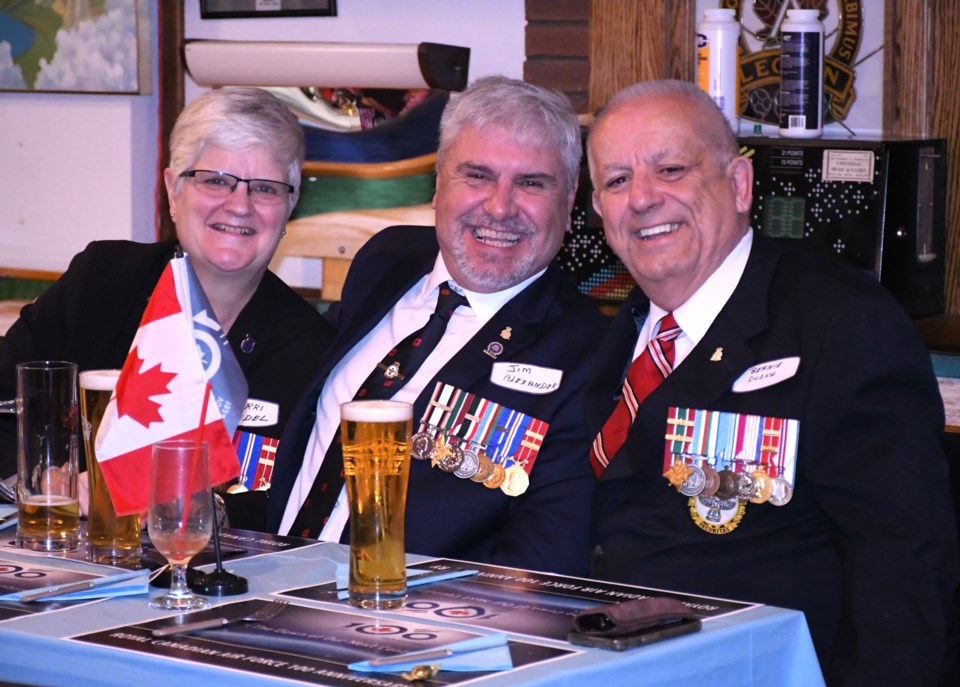MOOSE JAW — People who join the military usually develop a special and long-lasting relationship with others who served, as evidenced by three Moose Jaw veterans who affectionally call each other a “meathead.”
Jim Alexander, Bernie Dudka and Sherri Wedel all served as military police (MP), while they all either finished their careers in Moose Jaw or moved here in retirement. The trio recently discussed their time with the Canadian Armed Forces and the friendships they developed with each other and others.
“One of the biggest things about the military is the comradeship. That never goes away. You can have friends all over the world,” said Wedel, who noted that she and Dudka worked together at Cold Lake, Alta., while she was stationed in Winnipeg when Alexander was at Shiloh, Man., and the two men served in Afghanistan.
Said Dudka, “It’s a big family, and it’s something you’ll never take away from the military.”
Alexander agreed, saying the military is a “unique family and a unique culture.”
“And the weirdest thing for me is when I retired to Moose Jaw (and ran) into everybody — well, these guys,” he said. “We have a group of five or six of us who are all military police, and all served here or retired here.”
During the conversation, the trio called each other a “meathead,” a word that they insisted was more humorous than insulting.
The word arose during the Second World War when MPs controlled intersections during campaigns in Western Europe to ensure traffic flowed smoothly. Whenever a convoy moved to the front, a crew commander or officer would tell a soldier “to go meet the head” because all anyone saw of the dug-in MP was his helmet.
“So a lot of people think it’s an insult to the military police, but actually it’s a compliment,” said Alexander.
When asked whether that word of endearment was spelled meethead or meathead, Dudka replied, “It depends on how you look at it. We look more at it as m-e-a-t-h-e-a-d.
“We’re all meatheads; we’re proud meatheads,” he added, with Alexander and Wedel agreeing.
Alexander joined the military because his father and grandfather had served in the forces and he felt called to serve, while Wedel joined because she had always wanted to be a police officer and an MP spot opened up before positions in other police forces.
Dudka also wanted to be a police officer because his father and uncle served in the Provost Corps during the Second World War, while his brothers also became cops. He noted that his father was his biggest influence in joining the military.
Dudka’s father, Stanley, was one of several soldiers who helped convict notorious German General Kurt Meyer during the Nuremberg War Trials. Meyer led the fanatical 12th SS Panzer Division Hitlerjugend and ordered the killing of 20 Canadian prisoners of war at the Ardenne Abbey in June 1944 because the German unit had no resources — or food — to care for the PoWs.
The elder Dudka — who was with the North Nova Scotia Highlanders — had also been taken prisoner, but because he had three chocolate bars, convinced Meyer to release him and three others.
“My dad had three or four cousins that were in there, and (the Germans) told my dad, ‘OK, pick the people you want to save.’ And my dad picked out three of his cousins,” said Dudka.
“They pulled to the side, and right after that, Kurt Meyer went behind each (remaining PoW), put a Luger at the back of their head and shot them.”
Stanley later escaped, but not before breaking into Meyer’s office and taking an SS flag and the murder weapon, which was used as evidence during the trial.
Veterans — especially those who fought in Afghanistan — can usually recognize each other by their battle scars or, more commonly, by the medals on their chests, the MPs said. Since over 80,000 soldiers received a medal for fighting in the West Asian country — some received multiple bars for multiple tours — they usually approach each other to learn about when and where the other served.
The MPs added that with how long each served — Alexander, 34 years; Dudka, 33 years; and Wedel, 31 years — they collectively have almost 100 years of service to Canada.




